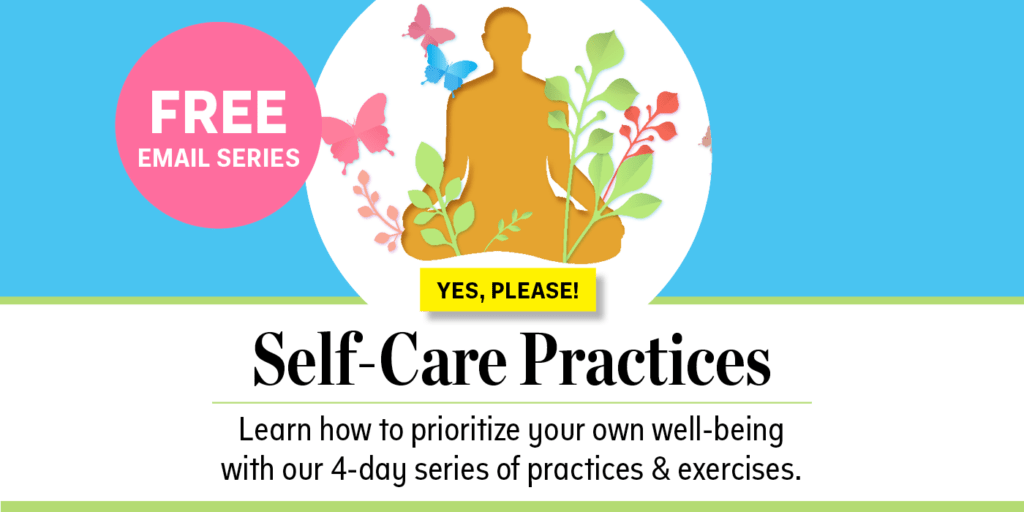
Self-care means asking yourself what you need and following through on the honest answer. Practicing self-care can be as simple as getting to bed earlier on a work night, or as hard as taking a look at some of the habits you’ve created for yourself and their long-term effects.
Key Summary
What is Mindful Self-Care? An approach to self-care that combines intentional attention with compassion toward oneself.
Key Elements:
- Presence – being fully aware during self-care activities
- Body awareness – tuning into physical needs and sensations
- Self-compassion – treating oneself with kindness during difficult moments
- Boundary-setting – mindfully deciding what’s needed for wellbeing
Mindful Self-Care Practices:
- STOP practice (Stop, Take a breath, Observe, Proceed)
- Brief body scans to check in with physical needs
- Mindful moments throughout the day
- Compassionate self-talk and self-soothing
Benefits: Prevents burnout, builds resilience, enhances emotional regulation, and creates sustainable self-care habits that address genuine needs rather than temporary fixes.

What Is Self-Care?
Self-care is the practice of taking an active role in protecting our own well-being, pursuing happiness, and having the ability, tools, and resources to respond to periods of stress so that they don’t result in imbalance and lead to a health crisis. Self-care means asking yourself what you need, and following through on the honest answer. Self-care can be as simple as getting to bed earlier on a work night, or as hard as taking a look at some of the habits you’ve created for yourself and their long-term effects.
The History of Self-Care
The “radical” concept of self-care was born during the civil rights era, a time when brave individuals were fighting the relentless enemies of prejudice and discrimination. These American heroes created the first real communities of care, standing strong together in the face of seemingly impossible challenges and unspeakable treatment.
It can’t be lost on us that one of the concepts they were fighting for was (and remains) the basic human right to self-care. People of color were often denied medical treatment at hospitals and healthcare centers. The government had turned its back on them. Self-care, quite literally, became a matter of life and death. They were fighting an exhausting battle and the only support to be found was in each other and within themselves.
The basic idea of being able to care for oneself, of having the time, money, and resources necessary to do so, was born out of the civil rights movement.
How to Build a Self-Care Movement
1) Let’s destigmatize mental health. We need to change the way we look at mental health and make sure every person has access to the caregivers, transportation, treatment, and funds needed to properly address mental health.
2) Commit to sharing your self-care knowledge. We all have daily routines and personal challenges. But let’s stop trying to go it alone. When we take the time to create space in our schedules for others; when we organize and meet up with our friends and social groups; even when we exchange a few thoughtful emails, we’re building communities of care and, therefore, fueling the self-care revolution.
3) Help define the standards. The slow adoption of self-care in our culture is in big part due to a lack of definition. We don’t know what the standards of self-care are, or should be, because they’ve never been clearly established. Once we define the standards for self-care, it will legitimize our cause by providing a clear roadmap for people to follow. They’ll be able to create a plan, measure their progress, and make changes along the way based on realistic and achievable goals.
4) Understand that exhausted leadership is poor leadership. Exhaustion leads to shorter attention spans, increased emotional volatility, and poor decision making—Not exactly the qualities of a great leader. That’s why it’s vital that our efforts in leading the self-care movement are sustainable. If we burnout, it will be replicated by our staff, volunteers, children, and others in our sphere of influence. To create a culture of self-care we must be willing to model a sustainable work pace.
5) Ask reflection questions to yourself and your team. In the effort to move from reflection to action, and to build momentum to climb that next peak, we should ask ourselves key questions that will help us improve our own self-care habits and that of those around us. These questions may include:
- How does the quality of my leadership diminish due to the lack of my own self-care?
- Which habit(s) negatively impact my self-care and what new behavior can I substitute it with?
- Do I have a self-care plan in place to ensure I follow-up on this new behavior and have I shared this plan with others who will hold me accountable?
- How will I track my progress along the way?
- How can I best support my staff/volunteers/friends/family members in their endeavors?
The modern self-care movement needs to start as a practice to avoid burnout, rather than as a response to it. The movement must demand that individuals put their health and wellness first without feeling guilty for doing so.


Why Is Self-Care Important?
Self-care can be an intervention tool that keeps you from being completely sucked into the vortex, saving you when you find yourself standing on the precipice gazing into the dark abyss.
3 Reasons You Need a Self-Care Plan
A Self-Care Plan is a fail-safe, created by you, and filled with your favorite self-care activities, important reminders, and ways to activate your self-care community. Here’s why it’s important to create your own Self-Care plan:
1) Customizing a Self-Care Plan is a preventative measure. By designing a roadmap that is unique to you, in moments when you’re NOT in crisis, you’re directing your best self to reflect on what you may need (and have access to) in your worst moments. The reality is that only YOU know how intense your stress levels can get and what resources are available to you.
2) Having a plan takes the guesswork out of what to do and where to turn in moments of crisis. From a mindfulness point of view, it helps you respond instead of react to the situation at hand. When you have a plan in place, you’ll feel more in control of your circumstances and life won’t feel quite as chaotic. (It also makes it easier to ask for help from those you share your plan with.)
3) A Self-Care Plan helps you stay the course. You’ll find it far easier to stick to your personal care strategy and avoid falling into the trap of making excuses. Having a plan helps you establish a routine, ensuring that you and your self-care partners don’t wind up in isolation. Instead you can check in with each other, hold each other accountable, and share the responsibility to support one another.
How to Create a Self-Care Plan
Your Self-Care Plan is a roadmap that you can carry in your back pocket. It’s there to help you walk your talk as well as help you find your way back to equilibrium by providing a clearly defined route back home if you find yourself on off-track.
1) First, create an activity list organized around different parts of your life. One of the easiest ways to start is by breaking up this daunting task into several categories, for example:
- Work
- Physical Fitness
- Emotional Life
- Relationships & Community
For each area above, write down the activities or strategies that you can call on, that are authentic to you and contribute to your well-being.
Some examples include spending time with friends, being active, mindfulness meditation, and finding the confidence to create healthy boundaries (here’s a template). Have fun, be creative, and most importantly, be real with yourself about what works for you and what doesn’t.
2) Second, note any barriers that may be in your way and how to shift them. As you write down each activity, ask yourself what barriers might get in the way of you being able to accomplish it.
3) Third, share your plan with your closest friends. Don’t forget to rely on your network of self-care buddies, your community of care.

How to Practice Self-Care
The main idea is that neither “fighting” nor “fleeing” are sustainable. More than that, they are responses we can move away from, we can evolve beyond. We often hear that our brains are hard-wired for fight-or-flight, that “we evolved this way,” but we know now that we continue to evolve. Our brains can be rewired.
How can we evolve beyond fight-or-flight? By choosing to move toward two new responses: empathy and action, which all starts with self-care.
A Few Ways to Practice Self-Care Today
Grass-roots meditation activist Shelly Tygielski offers three ways to practice self-care so we can recharge, refresh, and rewire for action.
- Allow yourself to (finally) unplug from the news and social media for a few days. Turn off your alerts and push notifications, turn off the TV, and don’t access social media. If you must access it for work or otherwise, limit your time and do not engage or comment on posts. It’s not forever—it’s a few days of peace and being off the grid.
- Recognize when you are in need of self-care and then respond to that need. Sometimes taking time for self-care may impact the lives of those around you (for example, you need to take the day off from work or ask for someone to watch the kids). Inform those around you that you are responding to a personal need but do not feel the need to ask for permission.
- Have a self-care checklist ready that has dozens of options tailored just for you. These self-care options can range from scheduling a mid-day call with a friend to drawing a bubble bath. Having this list ready is important because when you are on the verge of burnout, you may not have the capacity to come up with the options at that moment.
The Most Courageous Self-Care Act: Learning to Say, “I Need Help”
Are you the type of person who’s too busy driving from place to place to stop and fill that gas tank with the beaming low fuel light? Too busy rushing about to take a moment? Too guilty to take a pause even though it’s clear you need one? Perhaps, you don’t feel empowered enough to demand a break? Or, maybe you’re just so caught up in your day that it’s easier to ignore all the signs telling you it’s time to pause, breathe, and assess the situation.
Being able to identify the need for a “personal moment” is critical. However, the reality is most of us are already pretty good at this part of the equation. Where we tend to fall short is acting on our own recognition. It’s not enough just to notice that low fuel light inside your head. You have to do what it’s telling you—pull over, put it in park, and refuel. This isn’t always easy and, in fact, often requires a good bit of personal courage.
3 Self-Care Tools for Claiming Your Healing Time
1) The Confession Statement: Name it to Tame It
In a nutshell, the “name it to tame it” or “confession statement” allows you to acknowledge your fears internally, while openly admitting your needs to a confidant. A confession statement might go something like this:
“I’m a little nervous to admit this and I hope you will accept it, but I need to take a step back. I need a quiet moment to find clarity of mind and spirit.”
You, the confessor, finds a welcoming and non-judgmental ear. Your confidant knows that he or she is being trusted with your vulnerability, freeing you of burdens that inhibit your self-care. It’s a pretty good feeling all around.
2) The Pre-Ask: Asking For Help or Space Before You Actually Need It
Most people refuse to ask for help or acknowledge that they need a little space until their anxiety is already at a boiling point. Let’s go back to the “low fuel” light analogy. When the light comes on, you know you’ve only got about 30 miles before running out of gas. But, hey, that’s still 30 miles! No need to start looking for a gas station immediately. Why worry about what’s going to happen down the road, right? In the case of self-care, it’s the accumulation of stressors that haven’t been addressed that flick on that light. These stressors get more and more critical as you head down life’s road, piling up and piling on until you find yourself with an empty tank—or burnout.
In other words, don’t wait too long. Let those you trust know when you feel like you’re approaching the point of needing help or a step back. Give them time to ready themselves so that they can be more effective when you do reach out.
A pre-ask invites someone to accept your request for help, space, or time before you actually ask for it.
3) The Kindness Factor: Remember That People Love To Help
Think about the last time you helped someone, or were willing to recognize their need for space. Chances are you came out of the experience feeling a powerful sense of gratification, goodwill, and pride. That’s because we humans actually love helping each other. We’re hard-wired for empathy. We like doing good things for one another, which is why acts of kindness large and small happen all around the world every single day.
It stands to reason, therefore, that there are plenty of people in your life who at one time or another would have been happy to help you had they been asked. They would have gladly watched your kids, assisted with the project you were stuck on, or just given you the space you needed to take a moment of reflection. The problem was never their willingness to help you. The problem was and is your fear and inability to reach out with the ask.
People who want to help are out there. But you have to open the door and invite them inside.

Emotional Self-Care for Difficult Times
Acknowledge the hopelessness you feel, refrain from wearing a mask of happiness, remember that nothing is permanent and that clinging to anything—whether it be hopelessness and despair or our plans to change the world—confines us to suffering.
This too shall pass.
How to Engage in Emotional Self-Care
1) Connect with others who are passionate about the same issues. Whether it’s your self-care buddies, community of care, or a local organization or campaign you are volunteering for, surround yourself with people who can understand how you feel. Venting alone doesn’t help. But combine complaining with action? There is a winning recipe!
2) Put good deeds back into the universe—directly. Focus on creating that human connection, on giving back, and on showing others that there is still kindness in the world.
3) Curate your methods of staying informed. Truly evaluate how much news you are absorbing and be mindful of how the news affects you—physically, mentally and emotionally.
How to Manage Difficult Emotions Without Suppressing Them
When it comes to regulating difficult emotions, there are two ways most people respond: they act out or they suppress. If you act out with a strong emotion like anger, you will most likely create undesirable consequences in your relationships, your work, and even your play. The ripple effects of acting out usually provoke more anger around you, which leads to more difficulty. The consequences of suppressing those big emotions can be even more dangerous.
What many people aren’t aware of is that there’s another way to regulate our emotions: Feel the feeling in real time.
On one level, emotions are like energy waves, varying in shape and intensity, just like ocean waves. Their nature is to arise and pass away pretty quickly, like all natural phenomena. If you attempt to interrupt this process, through acting out or suppressing, several things can happen. Tragically (and ironically), efforts to “talk yourself out of your emotions” often results in “increased rumination and perseveration.” In other words, you will keep thinking about and holding onto those emotions you’re trying to avoid. Anyone who’s had a deep tissue massage has empirical evidence for how the body holds suppressed feelings. Suppression gets held in the body and creates a host of downstream effects including anxiety, depression, stress-related illness, all the way to substance abuse and suicide
The Embarrassing Truth of Self-Care
Contributing editor, Anne Alexander, shares some cringeworthy reasons why self-care might just be something worth considering.
Self-care can be a touchy subject. It certainly was for me.
I used to think that “self-care” was for privileged, entitled, lucky folks who were out of touch with the lives of real people. And that made me angry. Jealous and snarky. I conjured self-care as something for Lululemon-wearing stay-at-home mommies heading off to pilates vs harried, hectic, frantic single working mothers like me who were barely keeping it together.
Yep, I was one of those people who sneered at self-care.
Instead, I ran myself ragged, giving all of my time, energy and attention to my work, my kids, keeping up with my bills, the house, the dog, until my frantic, precarious world exploded in one horrifying moment. I got “downsized.” Let go. Laid off from a job that I had moved my family hundreds of miles to take, the one that paid my bills, kept a roof over our heads, where I loved my colleagues, where I tap-danced like mad to turn around the company’s stomach-churning financial problems. In one short conversation, I got jolted out of a job that I thought was the center of my being.
As the shards of my life got blown to smithereens, I discovered—if I’m being embarrassingly honest with you—that there had been one very important missing ingredient all along. That ingredient was self-love.
Self-love. Ugh. Another awkward subject. Self-love is even harder to talk about than self-care. In fact, the sound of self-love can still give me the creeps; it makes me feel weak, pathetic, and vulnerable. Like it’s an admission to being such a loser that no one loves you, so you’ve got to love yourself your own damn self. How pathetic is that?
Well, pathetic, or not, what I learned is that ultimately, everything, including self-care, grows out of self-love. You first have to care enough about yourself to take care of yourself. You have to know that you matter in order to treat yourself like you do. And for some people, like yours truly, learning that was a long, slow journey with a priceless payoff.

Self-Care Practices to Use Every Day
Rethinking Our Self-Care During the Pandemic
Shelly Tygielski explains why intentional care for yourself is needed, now more than ever.
Besides disinfecting and washing my hands, I made a list of the best ways I could take care of my heart and spirit in these times, putting that proverbial oxygen mask on first before I tend to my family, my community, and the world.
Here are eight things that are on my extensive list:
1. Stick with my normal, daily meditation practice. It’s easy to lose track of time when the days blend into one another, but now more than ever, my twice daily meditation practice (20 minutes at a time) is so important. Also, I no longer have the excuse “I don’t have time” these days—all I seem to have is time, I just need to remain disciplined.
2. Maintain contact virtually by creating a schedule. Now is a great time to make sure that we check on the ones who matter to us, and those who we rarely get to see in person because they are so far away. However, it’s very easy to lose track of time—especially across time zones—so having a set schedule of times to check in, hang out and even eat “dinner” together can help to restore some social structure to the day.
3. Get outdoors. If you are blessed to live in a place where there are parks or waterfronts (that are not closed during the pandemic) and you can access them with walks, runs, and bikes, it’s a blessing that should not be squandered. Each day I commit to getting outdoors and moving for at least an hour, plus taking a barefoot walk on grass.
4. Give myself permission to cry. This is actually a point on my usual Self-Care Plan, which seemed appropriate to migrate over in these times. I know that I will inevitably feel sad, disheartened, or downright hopeless at times, but I also know that giving myself permission to feel these emotions fully and turn towards my suffering will help me release any pain or tension and help me see the sun through the clouds once again.
5. Create a venting-hour. Just like some families have adopted a “happy hour,” we’ve adopted a “venting hour.” It sometimes only lasts five minutes but being that we are all stuck together in close quarters for the next few weeks or months, we make sure that there is an “airing of grievances,” (just like in Seinfeld’s fictitious holiday, Festivus), so that nobody keeps anything inside. I found that it reduces the build-up of tension and makes sure that there is no resentment, which is possible for even the kindest amongst us.
6. Limit how often and through what means I access the news and information. I have personally noticed how I feel when I watch the news or hear certain people speak, so now, I limit myself to 30 minutes of news per day on the television with a news anchor and station I trust. Otherwise, I mostly get my news online by reading articles and transcripts of press conferences. I also make sure to not watch the news before I go to bed, because it can get me all worked up, which is counterproductive.
7. Be of service to others without depleting myself. Within a few days of people in my community being laid off, I started to get emails and see posts on social media from my friends and community members who were scared about having their basic needs met—food, medicines, and other essentials. I realized that because I did not share those concerns, I am in a position of privilege to help others and that I can use my platform to help neighbors, community members and even strangers. I put my grass-roots activism skills to work and launched the Pandemic of Love project, a mutual aid community that has connected more than 10,000 families in need with patrons who can offer help.
8. When all else fails, ask myself: “What do I need at this moment?” This is my default question—the one I immediately ask myself when I sense that I am not feeling right, physically or mentally. I just pause, take a long, slow deep breath and ask myself this question. In this space between, I almost always find the answer.
Each day, invariably, I find myself looking at this list. It provides me with a measure of comfort, reminds me that I am in control, and that in times of crisis, I have the choice to either be my own worst enemy, or my best ally. I choose the latter.
4 Self-Care Habits to Practice at Work
We are our own worst critic—and it could be holding us back in the workplace. Here are four ways to stop being so hard on ourselves and use simple moments during the day to wind down when we feel overwhelmed.
Practicing self-compassion is as important as applying compassion to others. When feeling self-compassion becomes challenging, try the following approaches:
1. Use lunch as an act of self-care. When you eat, take a moment to notice this nourishment you’re giving yourself. You have the power to choose to eat something that makes you feel good. Bonus: research shows that when you make a healthy food choice, noticing the positive feelings this gives you serves to reinforce the behavior, making you more likely to choose healthy foods the next time.
2. Remember that, just like you, we all feel like frauds. When you find yourself in self-deprecation mode, calling yourself names, telling yourself that you can’t do something well enough, and generally being a bully to yourself, remember that most people suffer from this “imposter syndrome,” the feeling that we are just pretending, that we don’t really belong, that we will be found out, that our true inadequacy will become obvious to the people around us, who are, for some reason, being tricked for the time being. The fact is that everyone you work with, no matter how self-assured they seem, experiences self-doubt. This is the human condition. And these are just thoughts, so you don’t have to believe them.
3. Be a friend to yourself. As corny as that may sound, it’s a trick my business school students have found incredibly useful. When you notice you’re being hard on yourself over a problem, imagine a dear friend coming to you with the same problem. How would you respond? How would you offer support? What would you say? How would you regard your friend? Now try giving these responses to yourself.
4. Ask for help. Many of us are caught up in the idea that we need to “be a professional,” which we equate as being stoic, handling things on our own. In this mind-set, we don’t think to ask for kindness or validation. In fact, we would likely refuse to accept it. Over time, though, this “I’ve got this” attitude begins to wear thin, and we realize we can’t do our jobs alone. Experiment with giving someone else the chance to support you. If this is a completely foreign idea to you, then I suggest you do it even more. People like to help! Think of how you feel when you get to help others. Helping people makes us feel good about ourselves and connected to others. So, instead of defaulting to “No, thanks” or “It’s okay, I’m fine” when someone offers you something, try saying yes.


